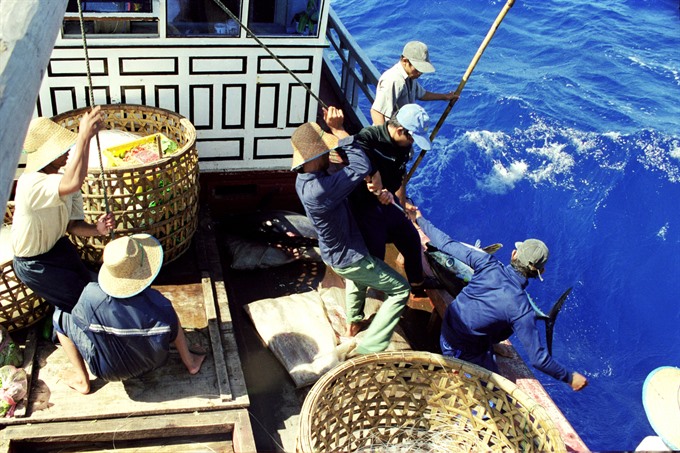 Society
Society

A National Assembly (NA) task force will monitor compensation disbursement and implementation of social welfare policies for fishermen and others affected by the mass fish deaths in central Viet Nam last April.
 |
| Fishermen on an offshore trip to catch sea tuna in central Viet Nam. - VNA/VNS Photo Xuân Trường |
HÀ NỘI – A National Assembly (NA) task force will monitor compensation disbursement and implementation of social welfare policies for fishermen and others affected by the mass fish deaths in central Viet Nam last April.
Fishermen and other stakeholders in the seafood industry were badly hurt by the mass fish deaths in the four central provinces of Hà Tĩnh, Quảng Bình, Quảng Trị, and Thừa Thiên – Huế. The deaths were caused by toxic waste disposal.
The task force was established recently following a resolution approved by the NA Standing Committee on implementing policies and laws related to seafood production enterprises and individuals engaged in the fisheries sector, “in conjunction with ensuring national defense and security.”
In the first month of the year, the task force will work with Government representatives on the above-mentioned issues.
Võ Trọng Việt, member of the NA’s Standing Committee, Chairman of the NA Committee on National Defence and Security Committee, will lead the supervisory task force.
Other task force members comprise personnel from different NA organs, representatives of the State Audit agency, Việt Nam Fisheries Society (VFS), Việt Nam’s Association of Seafood Exporters & Producers (VASEP), and a number of experts.
The central agencies – in addition to the government – that will fall under the task force’s supervisory purview include the Ministry of Agriculture and Rural Development, Ministry of Public Security, Ministry of Defence, Ministry of Planning and Investment, Ministry of Industry and Trade, Ministry of Natural Resources and Environment, Ministry of Finance, Ministry of Foreign Affairs, Ministry of Transport, Ministry of Construction, Ministry of Science and technology, Ministry of Labour, Invalids and Social Affairs, Ministry of Health and Ministry of Information and Communication.
The Government Inspectorate and the State Bank of Vietnam are also subject to supervision by the new task force.
At the local level, it will also monitor central provinces and municipalities where seafood harvesting, production, and processing activities take place.
Other entities subject to its supervision are seafood enterprises, seafood project management boards, and commercial banks that grant loans for seafood production.
The task force’s supervision agenda will focus on four key areas.
First, it will oversee the promulgation of, consolidation of, and amendments to existing legislations concerning seafood production and processing, as well as legislation aimed at ensuring national safety and security conducive to seafood production.
Second, it will scrutinise government’s directives, from central to local level, regarding the implementation of State laws and policies for seafood production in tandem with national defence protection.
Third, it will evaluate enterprises and individuals’ implementation of State laws and policies. Factors affecting the efficiency and sustainability of seafood production and processing, such as the development of fisheries infrastructure, support for fishermen, development of marine economic zones, and fisheries cooperation with other countries will also be overseen. Special attention will be paid to violations in seafood exploitation, production and processing, in addition to national defence and security issues.
Fourth, it will regularly review its activities, and draw experiences and lessons to contribute materially to the betterment of State law and policies on seafood production in conjunction with national defence.
The task force will submit its supervisory reports to NA deputies during the parliament’s fourth plenary meeting later this year. – VNS